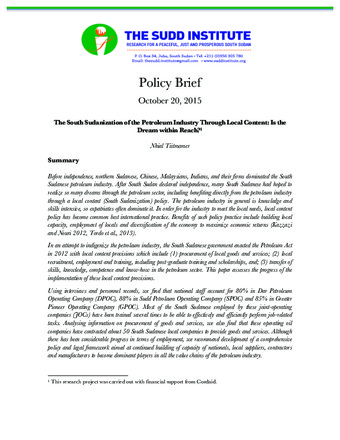The South Sudanization of the Petroleum Industry Through Local Content: Is the Dream within Reach?
Publication Summary
Before independence, northern Sudanese, Chinese, Malaysians, Indians, and their firms dominated the South Sudanese petroleum industry. After South Sudan declared independence, many South Sudanese had hoped to realize so many dreams through the petroleum sector, including benefiting directly from the petroleum industry through a local content (South Sudanization) policy. The petroleum industry, in general, is knowledge and skills intensive, so expatriates often dominate it. In order for the industry to meet the local needs, local content policy has become common best international practice. Benefits of such policy practice include building local capacity, employment of locals and diversification of the economy to maximize economic returns (Kazzazi and Nouri 2012, Tordo et al., 2013).
In an attempt to indigenize the petroleum industry, the South Sudanese government enacted the Petroleum Act in 2012 with local content provisions which include (1) procurement of localgoods and services; (2) local recruitment, employment and training, including post-graduate training and scholarships, and; (3) transfer of skills, knowledge, competence and know-how in the petroleum sector. This paper assesses the progress of the implementation of these local content provisions.
Using interviews and personnel records, we find that national staff account for 80% in Dar Petroleum Operating Company (DPOC), 88% in Sudd Petroleum Operating Company (SPOC) and 85% in Greater Pioneer Operating Company (GPOC). Most of the South Sudanese employed by these joint operating companies (JOCs) have been trained several times to be able to effectively and efficiently perform job-related tasks. Analysing information on procurement of goods and services, we also find that these operating oil companies have contracted about 50 South Sudanese local companies to provide goods and services. Although there has been considerable progress in terms of employment, we recommend development of a comprehensive policy and legal framework aimed at continued building of capacity of nationals, local suppliers, contractors and manufacturers to become dominant players in all the value chains of the petroleum industry.
Nhial Tiitmamer has served as the Director of the Environment and Natural Resources Program at The Sudd Institute where he is currently on leave to work with United Nations in South Sudan (UNMISS). He has served as an Adjunct Assistant Professor at the University of Juba where he has taught Environmental Economics, Natural Resources Economics and Environmental Sociology. Between November 2021 and November 2022, Nhial worked as Senior Environment Associate with the United Nations High Commissioner for Refugees (UNHCR) in Juba. Before returning from Canada in 2013, Nhial worked at Arletta Environmental Consulting in Calgary and at University of Alberta’s Augustana Campus in Camrose in Alberta, Canada. Nhial’s research focusses on natural resources governance, environmental protection, climate change, and sustainable energy. He was awarded in May 2023 by the Board of Directors of The Sudd Institute with Research Impact Award for policy impacts. Nhial holds a B.A. in Environmental Studies with a minor in English Literature from the University of Alberta and an M.Sc. in Sustainable Energy Development from the University of Calgary in Alberta, Canada.

